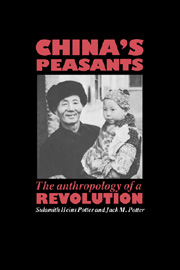Book contents
- Frontmatter
- Contents
- List of illustrations
- List of tables
- Preface
- Notes on the text
- Map 1 China
- 1 The old “feudal” order: Zengbu before Liberation
- 2 Establishing the new order
- 3 The ordeal of collectivization
- 4 The Cultural Revolution
- 5 Maoist society: the production team
- 6 Maoist society: the brigade
- 7 Maoist society: the commune
- 8 Impatient aspirations: transition to the post-Mao period
- 9 The cultural construction of emotion in rural Chinese social life
- 10 Marriage, household, and family form
- 11 Chinese birth planning: a cultural account
- 12 Lineage and collective: structure and praxis
- 13 Party organization
- 14 The party ethic: a devotion born of distress and enthusiasm
- 15 A caste-like system of social stratification: the position of peasants in modern China's social order
- 16 The Chinese peasants and the world capitalist system
- 17 The crystallization of post-Mao society: Zengbu in 1985
- References
- Index
12 - Lineage and collective: structure and praxis
Published online by Cambridge University Press: 02 December 2009
- Frontmatter
- Contents
- List of illustrations
- List of tables
- Preface
- Notes on the text
- Map 1 China
- 1 The old “feudal” order: Zengbu before Liberation
- 2 Establishing the new order
- 3 The ordeal of collectivization
- 4 The Cultural Revolution
- 5 Maoist society: the production team
- 6 Maoist society: the brigade
- 7 Maoist society: the commune
- 8 Impatient aspirations: transition to the post-Mao period
- 9 The cultural construction of emotion in rural Chinese social life
- 10 Marriage, household, and family form
- 11 Chinese birth planning: a cultural account
- 12 Lineage and collective: structure and praxis
- 13 Party organization
- 14 The party ethic: a devotion born of distress and enthusiasm
- 15 A caste-like system of social stratification: the position of peasants in modern China's social order
- 16 The Chinese peasants and the world capitalist system
- 17 The crystallization of post-Mao society: Zengbu in 1985
- References
- Index
Summary
The controversy between the relative explanatory merits of structuralism and Marxism is one of the most important theoretical controversies in anthropology. Are human affairs more importantly determined by productive action, and its relationship to an economic matrix, as the Marxists would have it, or are human affairs more importantly determined by the structures of the symbolic organization of experience, as the structuralists believe? Does the way people think determine what they do, or does what they do determine how they think? In his book Culture and Practical Reason, Marshall Sahlins argues that structuralism is superior to Marxism for the understanding of history. “What structuralism seems to offer,” he writes, is “a conception of the continuity in history,” and an explanation for the “seeming resistance of [cultures] to experience in the world.” He writes of the “immunity of the existing order to historical contingency” and the “domination of practical action by cultural conception” (1976, pp. 3–4, 18).
This debate provides a particularly apt setting for the analysis of the continuity in basic kinship structures which is apparent in the social lives of the peasants of Zengbu over the past three revolutionary decades. For the facts of the matter are that 35 years of living and working in socialist collectives have failed to change the deep kinship structures of the villagers. Is this continuity explainable simply by the enormous strength and absorptive power of the fundamental ideas of Chinese civilization, demonstrated repeatedly over the centuries – as the structuralists would have it?
- Type
- Chapter
- Information
- China's PeasantsThe Anthropology of a Revolution, pp. 251 - 269Publisher: Cambridge University PressPrint publication year: 1990



